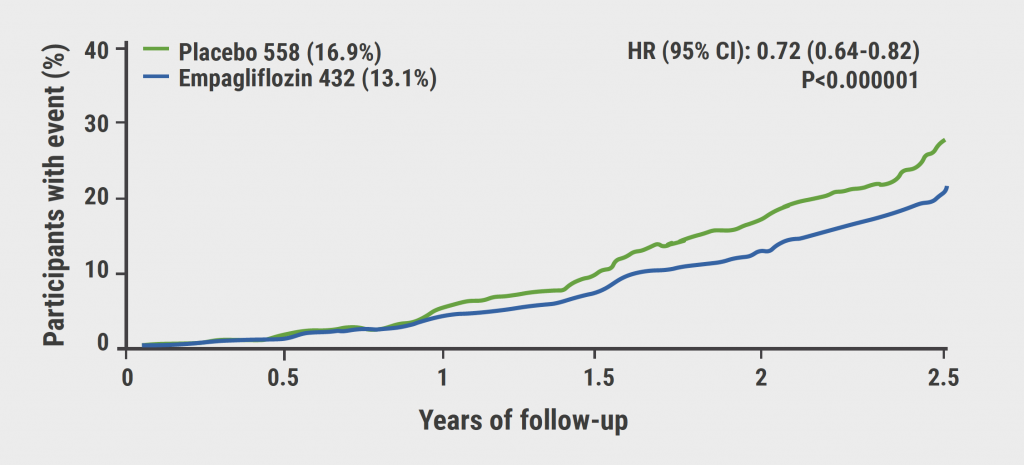https://doi.org/10.55788/f3f48173
Dr Matthew Griffin (University of Galway, Ireland) explained that MSCs simultaneously target multiple pathways of diabetic kidney disease (DKD). In the multicentre, randomised, placebo-controlled, phase 1b/2a NEPHSTROM study (NCT02585622), cryopreserved CD362-selected allogeneic bone marrow MSCs (ORBCEL-M) were investigated. The aim was to establish the safety and tolerability of a single IV infusion of allogeneic ORBCEL-M in patients with T2D and progressive CKD. The protocol was designed to include 48 adult patients with T2D and CKD between the ages of 40 and 85 years. Cohort 1, of which the results are presented, included 12 patients who received ORBEL-C 80 x 106 NEPHSTROM ORBEL-C and 4 patients received placebo. Total follow-up was 18 months. All participants were male with those in the ORBCEL-M group were marginally older. The proportion of serious adverse events was similar in both groups (see Table).
Table: Safety profile outcomes MSC therapy

Serial serum assays (multi-antigen bead Luminex) for anti-HLA antibodies indicated low-level sensitisation against Class I HLA in 1 subject from month 3.AE, adverse event; HLA, human leukocyte antigen; MSC, mesenchymal stromal cell; SAE, serious adverse event.
The annual rate of renal functional decline from baseline to 18-month follow-up showed an eGFR (CKD-Epidemiology Collaboration equation) of −2.6 with ORBCEL-M versus −8.7 with placebo (P=0.034) and an eGFR (Modification of Diet in Renal Disease equation) of −2.4 with ORBCEL-M versus −8.1 for placebo (P=0.034). “A potentially interesting observation was that the preservation of regulatory T cell numbers in ORBCEL-M-treated patients remained stable compared to the placebo-treated patients, especially in the first 6 months,” Dr Griffin said. “Total and memory Tregs correlated with serum levels of inflammatory mediators as well as with eGFR in the overall DKD cohort.”
- Griffin MD, et al. Safety and Preliminary Efficacy Results of a Novel Mesenchymal Stromal Cell Therapy in Diabetic Kidney Disease: The Multicenter, Randomized, Placebo-Controlled, Phase-1b/2a NEPHSTROM Clinical Trial. FR-OR40, ASN Kidney Week 2022, 3–6 Nov.
Copyright ©2022 Medicom Medical Publishers
Posted on
Previous Article
« Dapagliflozin improves anaemia in patients with CKD with or without T2D Next Article
Dapagliflozin reduces number of hospitalisations in patients with CKD »
« Dapagliflozin improves anaemia in patients with CKD with or without T2D Next Article
Dapagliflozin reduces number of hospitalisations in patients with CKD »
Table of Contents: ASN 2022
Featured articles
Chronic Kidney Disease
VALOR-CKD trial did not show any benefits for veverimer
EMPA-KIDNEY: empagliflozin slashes kidney disease progression or CV death
Combining UACR and GFR improves prediction of drug effect in CKD phase 2 trials
Dapagliflozin reduces number of hospitalisations in patients with CKD
Novel MSC therapy appears safe and effective in preventing decline in eGFR
Dapagliflozin improves anaemia in patients with CKD with or without T2D
Kidney Transplantation and Dialysis
Balanced crystalloid solution better for deceased donor kidney transplantations
Modified donor blood cells seem a promising option in kidney transplant recipients
Cooler dialysate does not offer any clinical benefits
Antiviral effect of MAU868 against BK virus prompts further research
General Nephrology
Medication-targeted alerts for the risk of AKI
Coaching with a DASH diet improves albuminuria
Cemdisiran shows promise in IgA nephropathy
Long-term nephroprotective effects of sparsentan in FSGS
Encaleret normalises mineral homeostasis in patients with ADH1
Adding voclosporin to MMF and steroids results in long-term higher CRR in severe lupus nephritis
Selonsertib poses risk of AKI in patients with DKD
Significantly higher risk of overcorrection in hyponatraemic patients with standard bolus infusion
Lowering blood pressure intervention favourable for CV outcomes
© 2024 Medicom Medical Publishers. All rights reserved. Terms and Conditions | Privacy Policy
HEAD OFFICE
Laarderhoogtweg 25
1101 EB Amsterdam
The Netherlands
T: +31 85 4012 560
E: publishers@medicom-publishers.com



